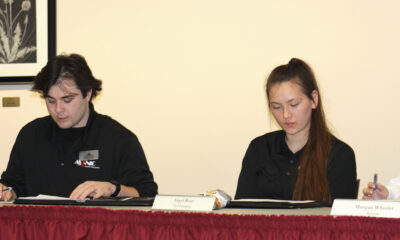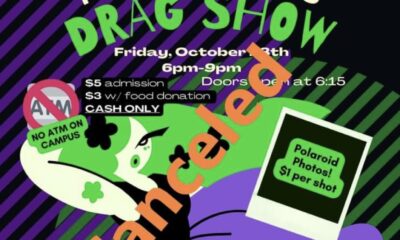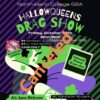Uncategorized
Occupy Movement brings protestors to Spokane
Local citizens gather on National Day of Action to Move Your Money
It’s no coincidence that the Occupy Movement’s “National Day of Action to Move Your Money” occurred Saturday, Nov. 5, the same day as Guy Fawkes Day.
Guy Fawkes, a British revolutionary who tried to blow-up Parliament in 1605, has become the mascot for the Occupy movement. Although Fawkes’ attempt failed miserably, thanks to literature, comics and the character Anonymous in the movie “V for Vendetta,” Fawkes has transformed him into a heroic-action figure. In order to avoid Warner Bros. Pictures (who released “V for Vendetta”) from profiting off the purchase of the masks, demonstrators have begun making their own.
On “National Day of Action to Move your Money” people were urged to stop using corporate banks and instead transfer their money to credit unions, financial institutions that are owned and operated by its members.
The Occupy Spokane movement has been in effect since October. Participants share the same sentiment as other Occupied cities; to address the inequality between the America’s 1 percent and the masses. The movement is considered leaderless.
Between 100 and 200 Occupy Spokane demonstrators gathered near the Riverfront Rotary Fountain in Riverfront Park at noon on Saturday, Nov. 5. In downtown Spokane, demonstrators spent 5 to 10 minutes chanting a variety of slogans in front of U.S. Bank, Bank of America, Wells Fargo and Chase bank.
Protestors toted handmade signs with slogans such as: “Too Big to Fail, Too to Bail!,” “99% Protestor, 100% American,” and “First they ignore you, then they laugh at you, then they fight you, then you win. – Gandhi.”
The temperature that afternoon was about 37 degrees, but that didn’t stop demonstrators from bringing their dogs, toddlers, infants, and instruments.
“You could call it a lot of diversity because there’s all different walks here,” said Geoff Scanlan, Spokane, who had closed his Chase account that day and transferred all his money to Spokane Teachers Credit Union (STCU). “Whether you would call yourself a daily professional or a dirty hippy, I only see one group. I see the 99 percent of Americans who have found out we are a community and that we support each other and that we don’t need the tyranny of the 1 percent telling us how to live our lives.”
Dustin Equality Jolly, 28, grew up in the Black Hills of South Dakota on a big family ranch, and moved to Spokane when he was 17. Jolly considers himself a facilitator and organizer of events, and began the march with the chant, “Move your money!”
Demonstrators marched toward the U.S. Bank building on Riverside Avenue chanting “Hey, Hey! Ho, Ho! Corporate greed has got to go!” and “We! Are! The 99 percent!”
For five minutes, demonstrators stood directly outside U.S. Bank chanting “U.S. Bank! You can’t hide! We can see your greedy side!” Passing cars honked in support.
Demonstrators chanted, “We’ll be back!” as they moved toward the Bank of America building on Monroe Street. Jolly initiated a call and response chant.
“Tell me what democracy looks like! This is what democracy looks like!” while a street punk with an American Flag bandana wrapped around his face beat out a rhythm on his African drum.
A single, somber looking security guard stood in front of the glass doors of the Bank of America building. Demonstrators spent about eight minutes chanting “Bank of America! You can’t hide! We can see your greedy side!” and then moved on to the next target, chanting “Wells Fargo! Here we come!” and “We! Are! The 99 percent!”
Demonstrators spent about seven minutes outside of Wells Fargo chanting, “Stop the war on the poor!” and “Move! Your! Money!”
“I’m so gonna lose my voice,” said Candice Walberg, 25, Spokane Falls Community College.
On the way to the Chase Bank building on Main Street, demonstrators chanted “We’ll be back!” and “We got sold out! Banks got bailed out!”
“I feel so ashamed you know. My money’s in there [Chase Bank],” said Walberg. “I’m definitely switching [to a credit union]. I should have switched a long time ago to be honest.”
There was at least one security guard outside of all of the bank buildings. Cop cars were stationed at multiple corners in the downtown area where the banks were located. Demonstrators were exceptionally careful about crossing the street, making sure that no one jaywalked, ran red lights or interfered with traffic.
“Chase Bank’s CEO makes over 10,000 dollars per hour,” said Jolly over his megaphone. “The time to take action is now! The time to move our money and transfer to a local credit union is now! This country is for the people, by the people, and corporations and big business have no business in it!”
Jolly handed the megaphone over to Mariah McKay, 28, Spokane, a member of the grassroots organization Washington Community Action. McKay said that when she went to close her account at Chase, the bank teller threatened to have her “escorted” out by a 6-and-a half-foot-tall 300-pound security guard.
“I just couldn’t believe that they were threatening me, just for closing my account and explaining why I was doing so,” McKay said.
McKay said she believes the teller was upset because she confronted her about Chase’s banking policies.
“I told her these big Washington banks in Washington state are keeping this extra 100 million [in tax breaks] that we should be putting in our schools, into our healthcare system to save the basic healthcare that will be cut,” said McKay. “In this next legislative section if we don’t raise revenue and close corporate tax loopholes and put that money where its needs most, we’re going to have no more basic health, we’re going to have zero disability life lines, child care, these are critical services! I told her [the bank teller] until I see accountability I will gladly leave this bank.”
Scanlan, who switched from Chase to STCU, said he saw four or five people close their accounts that day and that there’s a pledge of 80,000 nationwide. He said that you’d see a lot more closed accounts throughout the week because it takes time to close accounts.
“Am I personally going to affect what’s going to happen on this banks payroll? No. But that doesn’t mean I have to personally stay with them,” said Scanlan. “It’s a moral choice for me to get out and support the local unions. I was actually making money off this bank, but that doesn’t matter, because it comes down to personal choice that I didn’t want to be associated with the business practices that lead thousands to be homeless.”
Demonstrators paused briefly in front of the River Park Square mall on Main Street, chanting “We! Are! The 99 percent!” and “Corporations make too much! They don’t need a crutch!” before ending the march by the Monroe Street bridge, close to what is known as the Triangle, the designated Occupy Spokane area.
Jolly thanked everyone for coming to the march and notified the crowd of upcoming Occupy Spokane events.
“We need to wake people up and let them know what is going on. And the only way we’re going to do that is if we talk about it,” Jolly said. “We are not protesting employees of corporations. We are protesting the greed of corporations. When we have people from all different walks of life with no healthcare, we have a problem”
Jolly said his hope for the future of the movement is that it will never become violent or be “hijacked” and domesticated by a political party.
“I would like to see a new way of thinking and evolving in a new conscious society and something more about human beings and less about money and profit,” he said.
Jolly said he expects that things will slow down a bit in the winter, but said that the Occupy movements have been organizing a lot over Facebook and that spring will see a larger and more unified movement, with different cities coming together.
Josh VanVeen, Spokane, one of the demonstrators, said he found out about the movement through a Facebook photo.
“I noticed when I first started standing around waving a sign, I’d get flipped off more often than anything,” said Van Veen. “But as the weeks progressed there were moments where we couldn’t talk to each other because there was so much honking in support.”
VanVeen said his passion for the movement stems from his experience being homeless 10 years ago. He has since worked his way up off of the streets and has started to go to school, but is worried that despite his efforts and college education, he might end up back on the streets.
“What would make me happy is if they ratified the second bill of rights as proposed by Franklin D. Roosevelt, put it into law, and then removed corporate lobbyists form Washington DC,” said Van Veen. “If all that happened then I would put my sign down and go home.”
For information on Occupy Spokane join its Facebook page: https://www.facebook.com/OccupySpokane. Visit the website: http://www.occupyspokane.org/.








